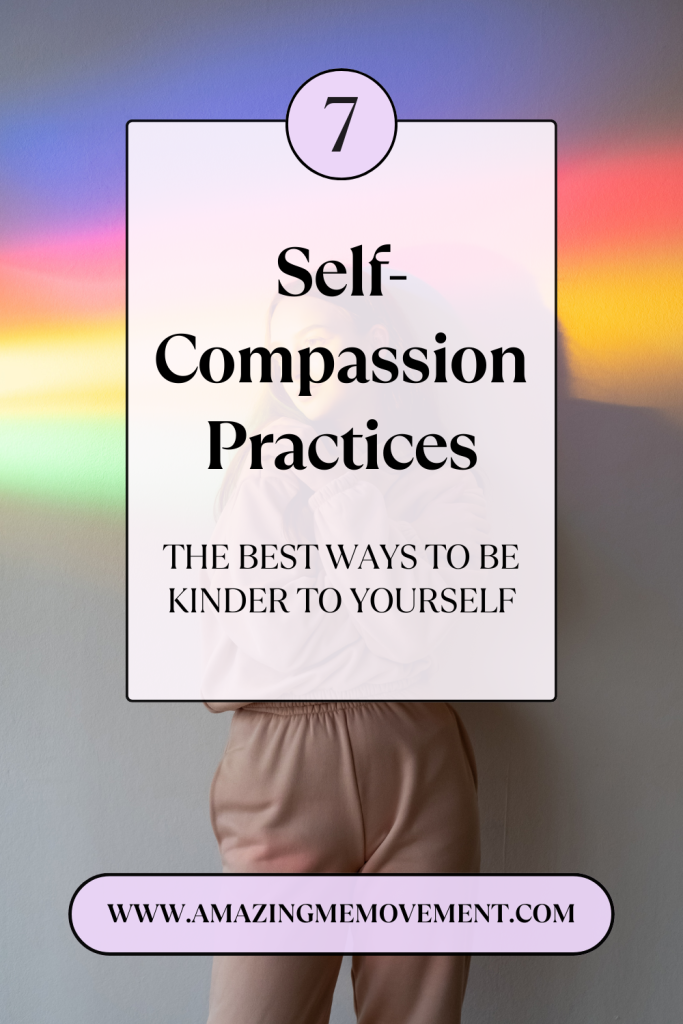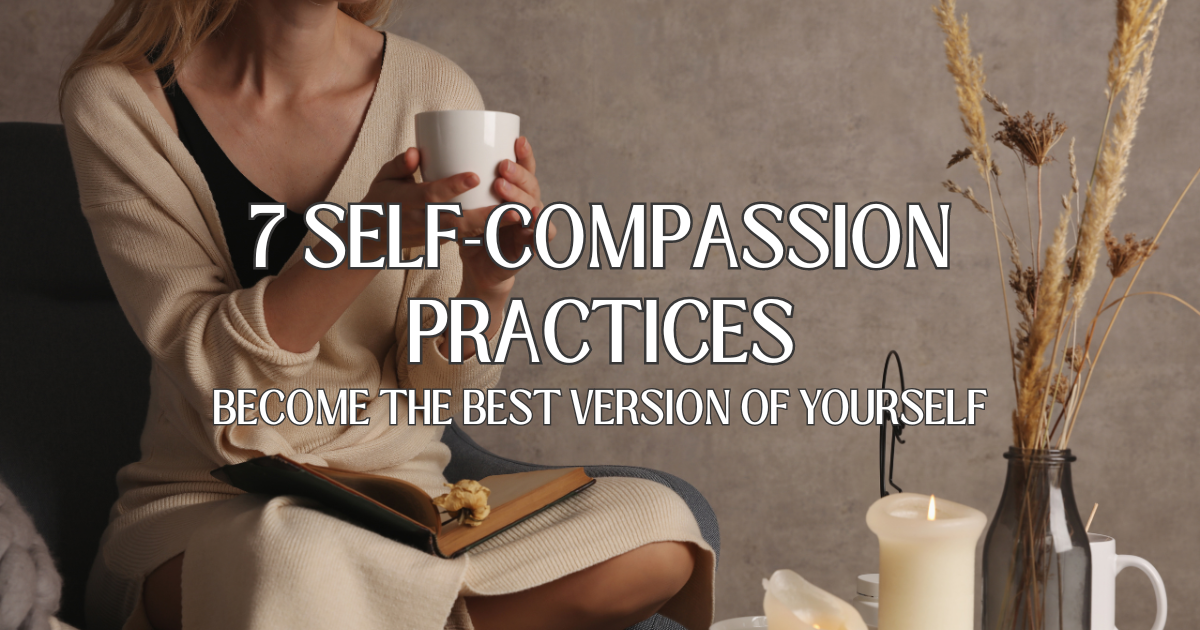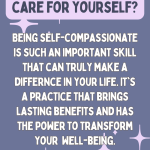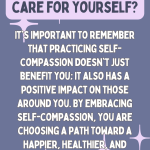Top 7 Self-Compassion Practices You Can Try
Last Updated on 9 months by Iva Ursano
In our journey through life, we have all encountered that relentless inner voice—the critical part of ourselves that belittles our achievements, doubts our worth, and fills our minds with negativity. This inner critic, also known as the “anti-self,” can be a significant obstacle to our personal growth and happiness. Its constant stream of negative self-talk can erode our self-esteem, hinder our relationships, and impede our overall well-being. Enter self-compassion—an antidote to negative self-talk that fuels personal transformation and emotional healing. That’s why the self-compassion practices on this list will help you form a better relationship with yourself.

Understanding the harmful impact of negative self-talk helps us realize the significance of embracing self-compassion. By doing so, we can confront our inner critic, fostering self-acceptance, resilience, and inner peace. It’s time to shift our mindset and unlock the transformative potential of self-compassion, paving the way for a brighter and more fulfilling life. if you’re looking for ways to improve your outlook in life, take a look at these confidence-building quotes and body positivity affirmations for a fresh take.
7 Self-Compassion Practices You Can Follow
1. Don’t apologize for how you feel

Your emotions are valid and essential, and nobody should dictate what you feel. In mindfulness, we observe emotions without judgment. Instead of criticizing yourself for overreacting, acknowledge your feelings with phrases like “I acknowledge that I feel angry” or “I notice that I’m feeling upset.” This validates your emotions and reduces negative self-talk. If someone dismisses your feelings, remember it reflects more on them than on you.
2. Celebrate your wins

One of the best self-compassion practices you can do is to take a moment to value celebrating your victories. Just as you cheer for coworkers’ achievements and support your children’s endeavors, remember to celebrate your own accomplishments. Whether it’s an extraordinary eight-hour open-heart surgery or simply getting out of bed, every victory, big or small, deserves recognition.
Embrace self-appreciation with a pat on the back, a symbolic high-five, or even a happy dance. Recognizing your achievements brings happiness and pride. So go ahead, revel in celebrating your successes, as you truly deserve all the celebration and appreciation in the world.
3. Be firm when saying “no”

One vital aspect of self-compassion is recognizing the importance of saying “no” and prioritizing your own well-being. When you constantly sacrifice your happiness and mental health to please others, you inadvertently send a message to yourself that their needs hold more value than your own. It’s time to break that pattern and embrace self-compassion.
For instance, imagine a situation where a co-worker asks you to take on their responsibilities on a particularly overwhelming day. Instead of hesitantly responding with a vague “maybe,” it becomes crucial to assertively say “no.” By prioritizing self-care and setting healthy boundaries, you ensure your well-being. This, in turn, enables you to genuinely help others from a place of strength and balance.
4. Let go of other people’s opinions

Among the self-compassion practices on this list, freeing yourself from the burden of other people’s opinions is possibly the best one. Self-compassion entails living a life that aligns with your happiness, fulfillment, and personal growth. Embrace what truly matters to you. If that means allocating 20 fewer minutes to work in the morning to enjoy a revitalizing walk with your furry companion, then that decision is perfect and completely valid for your well-being.
Remember, everyone’s perception of “perfection” differs, as it is subjective and unique to each individual. Focus on your own journey, prioritize your well-being, and release the need for validation from others. Embrace your individuality and confidently live life on your own terms.
5. Be kind to yourself

In your journey towards self-compassion, remember that the power of your words and thoughts is immense. When you consistently speak unkindly to yourself, using labels like unworthy, messy, or unforgivable, you allow those negative beliefs to take root within you.
From practicing positive affirmations to replacing negative labels with understanding and empathy, you can witness a remarkable transformation in how you treat yourself. Learn to recognize that you are a person who makes mistakes, rather than being inherently flawed. If you find it challenging to practice self-compassion, try envisioning speaking about yourself as you would speak about your dearest friend – with kindness, compassion, and unwavering support.
6. Take your time and do things you enjoy

It is crucial to prioritize doing things you enjoy as a form of self-compassion, particularly when struggling with feelings of shame. Despite the belief that you may not deserve to engage in pleasurable activities due to perceived flaws, it is important to recognize that you deserve to experience joy, upliftment, and excitement in your life. By allowing yourself to engage in activities that bring you happiness and dedicating time to self-care, you are actively demonstrating compassion towards yourself.
If you find yourself feeling ashamed for a mistake you made, make a conscious effort to understand the circumstances that led to that act. Then, focus on making choices that will place you in more positive situations, nurturing your well-being, and practicing self-compassion. Embrace the activities that bring you joy and let them be a part of your self-care routine.
7. Remove yourself from toxic situations

Removing yourself from toxic situations and friend groups is one of the most powerful self-compassion practices. Surrounding yourself with the right types of friends can truly transform your life and provide the support and understanding you deserve. However, it is equally crucial to develop the ability to recognize the early signs of what makes a bad friend.
This awareness empowers you to protect your well-being and prioritize relationships that uplift and genuinely care for you. Choosing to distance yourself from toxic situations is an act of self-compassion that allows you to create space for healthier connections and nurture your own emotional and mental well-being. Remember, you deserve to be surrounded by people who support and uplift you on your journey of self-discovery and growth.
What Are The Benefits Of These Self-Compassion Practices?
Being self-compassionate is such an important skill that can truly make a difference in your life. It’s a practice that brings lasting benefits and has the power to transform your well-being.

Here are the seven four benefits of being self-compassionate:
- Increased happiness – bringing a greater sense of contentment and joy into your life.
- Enhanced optimism – allowing you to approach challenges with a positive mindset and hopeful outlook.
- Heightened curiosity – fostering a sense of wonder and openness to new experiences and growth.
- Boosted extroversion – encouraging social connections and meaningful interactions with others.
- Self-improvement – heightened motivation to improve oneself, inspiring personal growth and development.
- Higher tolerance to stress – improved resilience during stressful events, enabling you to navigate difficulties with more strength and adaptability.
- Better well-being – reduced mental health problems such as depression and anxiety, promoting overall well-being and emotional balance.
It’s important to remember that practicing self-compassion doesn’t just benefit you; it also has a positive impact on those around you. By embracing self-compassion, you are choosing a path toward a happier, healthier, and more fulfilled life.
So, prioritize yourself, nurture your well-being, and let self-compassion be your guiding light. You deserve it, and the world around you will thrive because of it.
What’s Your Favorite Self-Compassion Practice?
The way we treat ourselves, the thoughts we harbor, and the words we speak to ourselves have far-reaching consequences. It extends beyond our individual experience and influences every aspect of our relationships and choices. This is why the act of choosing self-compassion holds such profound significance. Its impact goes beyond changing our own lives; it possesses the power to transform the world around us.
With heartfelt sincerity, I encourage you to try these self-compassion practices wholeheartedly. Nurture it, allow it to flourish within you. As you cultivate self-compassion, you will witness the positive effects it has on your relationships, your decision-making, and the very fabric of your world. Let compassion become your guiding light, and observe how it not only enhances your own existence but also uplifts and transforms the lives of those around you. You possess the incredible power to make a beautiful and meaningful difference.
If you enjoyed learning about the self-compassion practices in this post, make sure to read the following:







